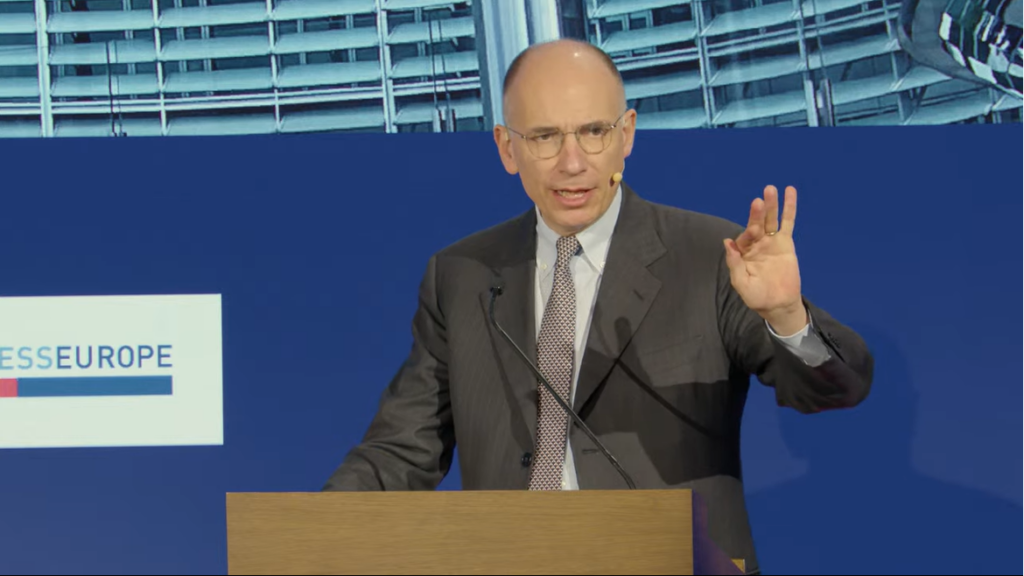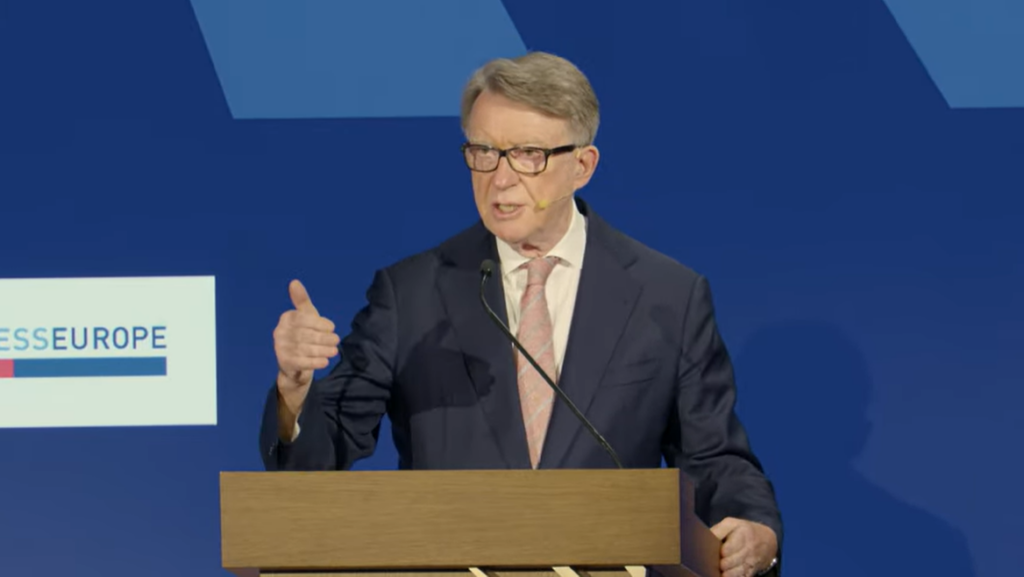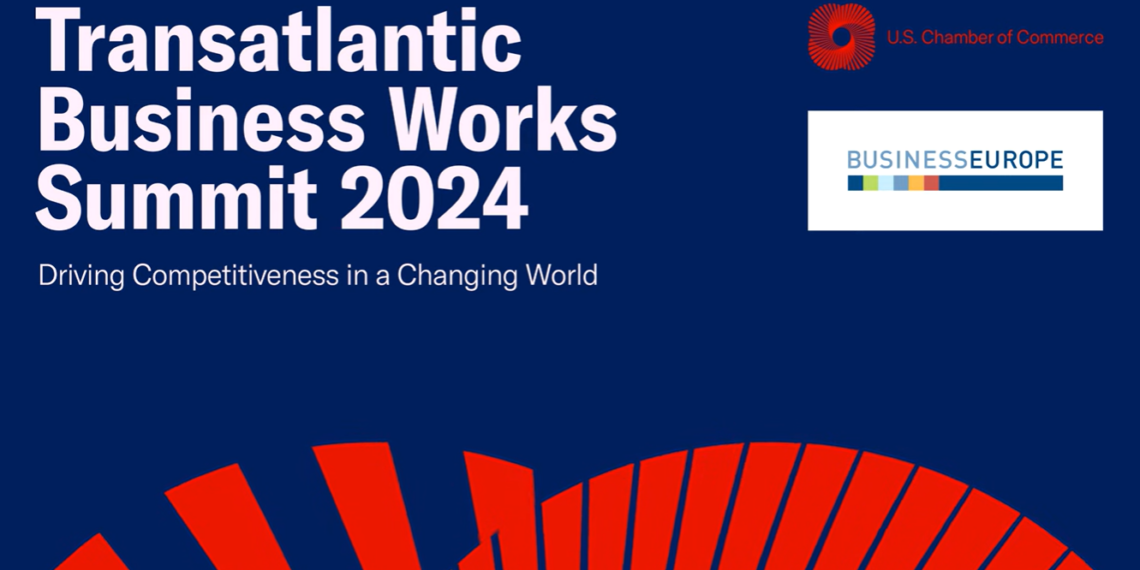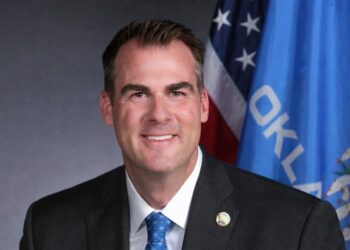WASHINGTON (OBV) — The creation of a transatlantic single market and the United States and European Union’s relationship amid China’s emergence as a global economic power were primary topics of discussion during the U.S. Chamber of Commerce’s 2024 Transatlantic Business Works Summit.
The summit, the full title of which is “Driving Competitiveness in a Changing World: 2024 Transatlantic Business Works Summit,” was held in Washington, D.C. on Tuesday and featured pertinent remarks from business leaders and policymakers from both sides of the Atlantic Ocean on how to foster a competitive and resilient transatlantic economy in the face of global challenges and opportunities.
The U.S. Chamber cohosted the event with BusinessEurope.
Former Italian Prime Minister Enrico Letta was one of the keynote speakers during the summit.
Letta said the geopolitical environment which surrounds the transatlantic market is why a new mission is needed. He suggested creating a transatlantic single market.
“It’s absolutely crazy that we have out of the table any discussion on how to strengthen the relationship between the U.S. and European Union,” Letta said. “And we know that politically this topic is out – it’s out in Europe and it is out in the U.S., but the rational brings all of us to say that in a world where we have China’s threat, Russian threat, and we are living with all these challenges, we have to strengthen our ties and our relationships.”
Before speaking specifically about a transatlantic single market, Letta looked back at the creation of a European single market.
“It’s a problem of scale and a problem of dimensions,” he said. “The main problem on scale has to be addressed in a different way in relation to the past.”

He said Europe’s single market was created to unite the three economic sectors, which he listed as energy, final share markets and telecommunications.
“It is almost impossible to be competitive if we are not able to have these three main sectors unified and integrated at the European level,” Letta said. “The lack of integration on these three sectors created a very unbalanced and asymmetric situation.”
The single market was effective in moving goods within its 27 countries.
“But at the end of the day, we did not have a single market for financial markets. We didn’t have a single market for telecom, and the same for energy,” Letta said. “So this is why I wanted to start my search for the new single market. The beginning of everything was to start with the three leftovers.”
Letta authored a report on how integrate the single markets on the aforementioned three economic sectors.
“it’s probably the most important part of the report,” he said.
The three sectors are fundamental for economic security, according to Letta.
“The geopolitical have a big impact on the way in which we consider how the European Union can deal with the new geopolitical challenges,” he said. “It’s very complicated to be in economic security mode if you are not able to have a single market on energy, a single market on telecom, and a single market on finance.”
Economic security and working at a global level is a main issue for the European Union, Letta said.
“We want a European Union able to work with the partners in a fair-trade environment,” he said.
Letta said he concluded his report with a provocative proposal: a transatlantic single market.
“I hope even this final provocation can make this report something useful. It is a toolbox, something that can make the discussions about our future easier. It is why I wrote this report and why I am so happy to be here to discuss it,” he said.
It is important that the concept of a transatlantic market not be considered a joke, Letta said.
“In our two-political environment, it is considered something totally out and coming out of the blue,” he said. “And I would like to use the report just to break the eyes of that and to say please in this electoral year in which we will vote in Europe for the European Parliament for the new political cycle in June. In this electoral year in the U.S., you will vote in November. Please put on the table the consequences of what happened geopolitically.”
China’s emergence as an economic power and Russia’s invasion of Ukraine are alarming concerns that underscore the need for transatlantic unity, Letta said.
He said it is not just a problem of foreign policy.
“It is a problem on the fact that the world around us is working on a different approach to rule of law, challenging our democracies, challenging our idea of rule of law, saying that in autocracy we run better than in democracy,” Letta said. “This is the main challenge we are having, and we have to react together on these challenges because we believe that we can more competitive in democracy rather than in autocracy.
The rule of law can be better for being competitive, and this is, I think, a big, big challenge and a big mission.”
The discussion of a transatlantic single union must begin this year, Letta emphasized.
“And I hope this discussion can be part of the debate in our two continents during this electoral year,” he said.
Lord Peter Mendelson followed Letta’s address with a fireside chat on the transatlantic relationship with China.
Mendelson is the chairman and founder the strategic advisory organization Global Council. He was commissioner for trade for the European Union between 2004-2008 and held a number of British cabinet positions.
He began his remarks by lauding Letta’s report, saying it is supremely important for both Europe and the transatlantic economy.
“The key to our future prosperity in Europe is external trade and internal trade, and for the latter, the internal trade, this will not grow without a stronger, deeper single market in our union,” Mendelson said. “A strong economic base is absolutely fundamental to everything else Europe wants to achieve both in respect to its prosperity and its security. So, I hope member states, and I hope the European Council, and I hope the European Commission and the Parliament take very close heed of what Enrico has said in his report.”

Mendelson said the American-European-Chinese relationship is the heart of the global economy, powering the last four decades of global growth.
“But [it] has now become overlain, as we know, with geopolitical and national security considerations,” he said.
He said the global economic triangle does not have even sides.
“The United States and the countries of the European Union are united by their belief in liberal democracy, a shared history, and a great deal of shared culture. As many people in this room can testify, also intense business and trade links,” Mendelson said. “But that does not mean that the United States and the European Union had a common view or an identical view of the right approach to China.”
China, Mendelson said, poses an enormous challenge.
“As Janet Yellen has said, China is now simply too large for the rest of the world to absorb its huge capacity,” he said.
Mendelson described China as, depending on the policy area, a partner, a competitor and a rival.
But there is a key difference between the United States’ regard of China and the way Europe views China, according to Mendelson.
“America has a problem with what China is, while Europe has a problem with what China does,” he said. “America sees China as a rival to its global leadership. The European Union, which is not a global superpower in the same way, does not see China in that way. It is not uncomfortable with Chinese power of and in itself. It does have a problem, however, with what China uses its power for, and I would say that problem falls into three parts.”
Europe’s first problem with China is economic, Mendelson said.
“EU countries generally believe that Chinese state capitalism and its lavish subsidies create unfair competition and an uneven playing field in trade. It is using that unfair competition to dominate certain industries particularly in green tech and to create unhealthy dependencies,” he said.
Second is security.
“Europe does not see China as a physical security threat as it does Russia, but it is concerned about its undermining democracy in Europe, its support for Russia, and the risk of war in East Asia,” he said. “We see China using heavily financed instruments of economic diplomacy to extend its international and its military network in every continent.”
China’s values is the third problem.
“Europeans object in particular to what is happening to the Uyghurs and in Hong Kong,” Mendelson said. “So, in practice, there is a considerable overlap as things stand. And we can go on to explore the common ground and the differences between us.”
Mendelson concluded his remarks with three final points about U.S. and European relations in the shadow of the emerging Chinese presence.
He noted that there are matters on which Europeans and Americans do not see eye to eye, notably in trade policy.
“The rules-based international order is axiomatic for Europeans at the [World Trade Organization], as much as elsewhere, and they see the U.S. administration continuing to pursue an ‘America first’ policy, which started, as we know, in President Trump’s administration, all be it more politely phrased under President Biden,” he said.
China’s efforts against the Inflation Reduction Act through the WTO will create a dilemma both for the European Union and the United Kingdom because the WTO agrees with China that the act is discriminatory and in breach of WTO rules, Mendelson said.
He said the U.S. discusses trade and friend shoring but makes no to little substantive economic offer to European or Indo-Pacific allies to orient them more towards the United States.
“Now, in my view, we need to look at how we can extend friend shoring to industrial policy. How we can create allied industrial capacity and joint-competitive supply chains amongst like-minded nations,” Mendelson said. “I think this is now the next stage in the transatlantic agenda, one that’s now very important to explore.”
Mendelson’s second point was that Europeans worry about the current stability of the transatlantic.
“Changes in the relationship, particularly in the defensive security alliance that lies at its core, would have a profound impact on how Europeans see their interests, including their interests visive China,” he said.
His third and final point was that there are shades of differing views between and within European countries on China. He said how these differences will evolve is going to be highly significant in the coming years.
“The EU generally does want to be on the same page as the U.S. geopolitically, and we are in earnest in seeking that, as is the United Kingdom as well. But we in Europe do not want to see our economic relations with China simply framed by the U.S.-China faceoff. And we felt that the U.S., quite honestly, has been a tad too unilateral in its approach to date,” Mendelson said. “So, let’s debate, let’s discuss, and let’s see more consultation between us, which should lead to a more unified outcome in policy.”
The summit, in its entirety, is shared below:

















